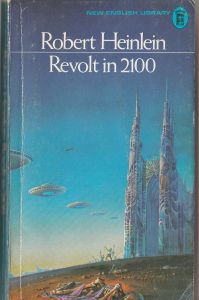Robert Heinlein: Revolt in 2100 – a re-review
I have always liked science fiction. One of the first things I ever published, in a science fiction “fanzine” called Surg that I made as a youth in the 1960s, was a comparison of Huxley’s Brave new world, and Orwell’s 1984. I learned English by reading the new wave of science fiction novels that appeared in the late 1960s, and by the time I came to Le Guin’s Left hand of darkness, there was no going back. The paperbacks back then were fairly cheap even for a student, so over time I ended up with a large collection. Later, I have sifted through it, sorting out the least interesting stuff, but the collection remains ca 14 shelf meters. Sometimes, when I go back to novels I read back then, I think, well-well. Actually they still often have interesting ideas, but they don’t really work, today. These go to the “out” bin.
It is all the more a joy, therefore, to discover a novel that is still fresh and fine – or in a sense, even more so, in view of events today, including the threat of neo-authoritarian takeover of the western democracies.
Heinlein’s Revolt in 2100 pictures a future state of the USA taken over by right wing theocratic fundamentalists – working effectively through mass psychology and technology to control the population. It follows some of the same lines as The handmaid’s tale but was written twenty years before.
Heinlein does not have Atwood’s touch relating to gender, but what he does have, is interesting. It is a “young” Heinlein writing, not the “fatherly” pen of his later years. He is somewhat surprised that women can be team mates in the revolution against the tyranny – quite delightfully pictured, a true document of 1950s roles, brought a bit into the future.
There is less of the doomsday feeling than in some of Atwood’s novels. There is a real hope for democratic revolution, and the book plots this in detail. The discussion of psychological coercion and torture is impressive – and sadly, not dated at all. The masters have drones – Heinlein calls them eyes – spying on the population, and uses advanced strategies to squash all opposition.
The novel is often downright scary reading, compared to US developments today. It portrays mass indoctrination and fake news, and the emerging cult of the strong leader.
Like in Asimov’s famous Foundation trilogy, a special trick is needed to overthrow tyranny. There, it is the second foundation; here, it is the attack on the beliefs underpinning the dictatorship, before the coup is attempted.
Heinlein fans write that “he is the greatest” and I do understand what they mean. At his best – and this is frequent in this little gem of a novel – he reminds me of the great sociologist Talcott Parsons, who could be very progressive, although he was known as conservative. This is one of Heinlein’s most progressive books, and a forerunner of his most famous novel, Stranger in a strange land.
It is in parts very naive, 1950s, masculinist, and so on – but don’t let it bother you. If you have a hard day, and want to know how to overthrow tyranny – try this one.


